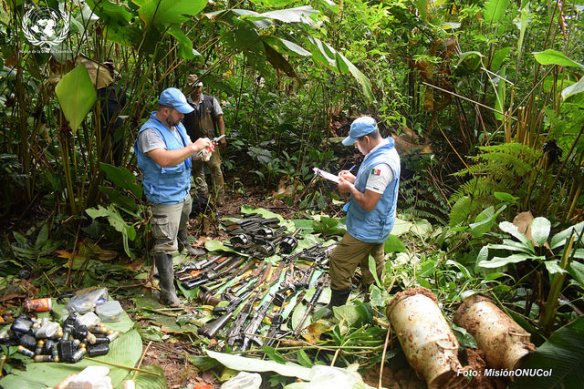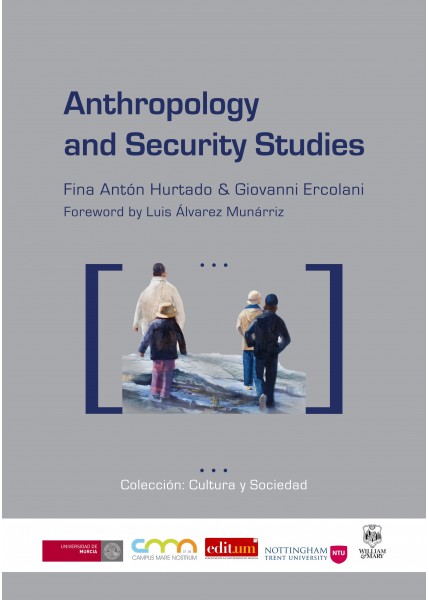By Johannes Langer, October 2017
Summary
After the peace agreement between the Colombian government and the FARC, the process of disarmament was successfully completed in summer of 2017. Major challenges regarding the reintegration process of former combatants are ahead that could reverse the successful implementation of the accords.
Successful demobilization

The UN Mission is in the process to establish the arms that were hidden across the country (Picture by MisionONU Colombia)
Disarming and reintegrating rebel groups is a key step towards overcoming civil war. After 52 years of armed conflict with the leftist Revolutionary Armed Forces of Colombia (FARC) and more than 200,000 dead, the Colombian government signed a peace agreement in November 2016 after four long years of negotiations. On over 300 pages in the accord, the ceasefire and Disarmament, Demobilization and Reintegration (DDR) process is outlined in detail to allow for a more peaceful Colombia.
In January 2017, the disarmament process started and almost 7,000 former FARC fighters moved to 26 transitory zones across the country. While the deadline to complete the process within 180 days was not met, demobilized combatants handed in some 9,000 weapons and three quarters of arms caches have been cleared. Importantly, the process has been monitored by the UN Mission in Colombia to create trust on both sides. This civilian mission has not only the responsibility to verify the DDR process but also to control the bilateral ceasefire between the two sides that both sides adhered to with only a few minor instances.
In August 2017, the transitory zones where FARC fighters demobilized have been transformed to special zones for reintegration. The former combatants go through a reintegration process. Colombia already has a lot of experience with individual reintegration, thanks to very well administered programs by the Colombian Reintegration Agency (ACR). Its challenging work was hardly noticed by the public, yet ACR has been able to complete reintegration of more than 15,000 former combatants according to the government’s reintegration scheme since its creation in 2011 and has followed the UN guidelines with its holistic approach to reintegration (including for example socio-economic and psychological issues).
In June 2017, President Santos declared to remodel ACR into the Reincorporation and Normalization Agency (ARN), following the demand of the FARC to distinguish their DDR process from the one of right-wing paramilitary groups and to stress to FARC supporters that it is the FARC’s decision to reincorporate and be part of society without being militarily defeated.
Challenges ahead

Demobilized FARC fighters are working in an agricultural project in their transitory zone (Picture by MisionONU Colombia)
ARN will have a huge task ahead. In institutional terms, the new body has just become part of FARC’s DDR process and needs to establish its presence in the reintegration zones. With a very limited educational background, former FARC combatants have low prospects on the job market. Finding employment for them is not easy considering that the majority never attended school. Another major concern of FARC members is their own physical security and the security of their families, having in mind the massacres against FARC members and supporters in an attempt to take part in political life back in the second half of the 1980s. In terms of gender, many female ex-combatants are now bearing children (after a very strict policy of not being allowed to do so), there is even talk of a baby boom, that could either help to convince their partners to remain in civilian life or rather push them to illegality to make a living.
Finally, it is politics that the FARC is now also engaging in. Officially being transformed to a political party on 1 September 2017, it was the leftist wing under FARC leader Iván Márquez that won against the line of Timoshenko, leader of the pragmatic faction, to keep the initials ‘FARC’ that now stand for ‘Common Alternative Revolutionary Force’. Prospects for many votes in the 2018 parliamentarian elections appear to be limited to a few zones where the FARC has a certain popularity. Importantly for the former rebel group, the peace agreement promised them five seats in each of the two houses of parliament. Most FARC members seem to be in line with the leadership of engaging in democratic politics. However, some ex-combatants question the reintegration process, arguing that the Colombian state does not comply with the DDR process while they are being offered lots of money from illegal armed groups. There are already news reports claiming that several dozens of demobilized fighters left the transitory zones to join other illegal armed groups.
Another issue is that the civilian population continues to suffer under displacement, as well as intimidation and assassinations of social leaders as the Colombian NGO Indepaz pointed out in its recent report.
And then there is the question of funding: Colombia’s budget is tight due to the low oil price and U.S. President Trump has proposed to severely cut the financial support for the peace process. Several deadlines of the process have not been met, promises to demobilized FARC fighters have not been kept regarding the conditions in the transitory zones and many Colombians remain suspicious of the process.
Verdict
The disarmament and demobilization process took place without major incidents and that is a success in itself. However, the road to reintegration during the next years will be difficult and the presidential elections in 2018 could undermine the reintegration process if an adversary of the peace process is elected. Also, if the peace negotiation with the second biggest guerrilla group ELN succeed and other illegal armed groups will join as well, ARN will have an even more demanding task to fulfil.

 The day before the
The day before the 